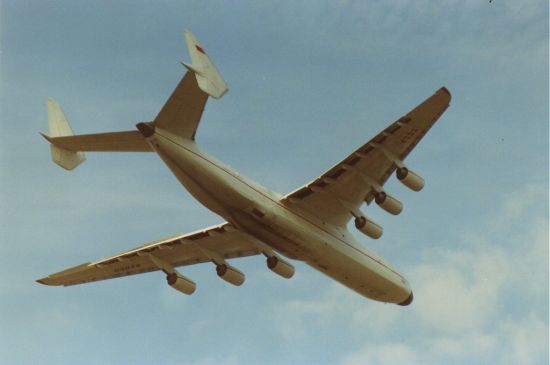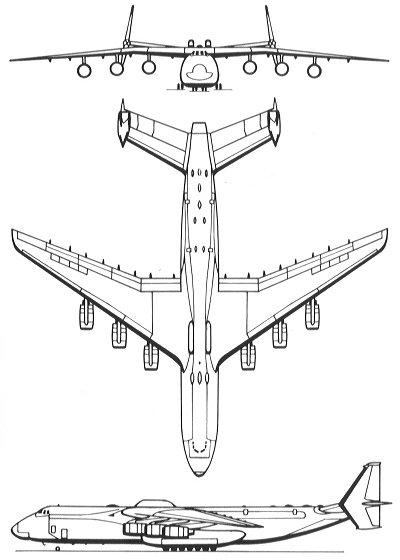|
||||||||||
|
|
||||||||||
|
||||||||||
|
|
||||||||||
 - -
 - -
|
|

|
Antonov An-225 Mriya ASCC codename: Cossack Heavy Transport |
|
DESCRIPTION:
Currently the world's largest airplane, the An-225 Mriya (dream) is an enlarged version of the An-124. The original purpose of the An-225 was to ferry large components used in the Soviet space program. These duties were formerly performed by a modified M-4 Molot bomber, but this aircraft did not have the payload capabilities required by the rocketry developments of the 1980s. Antonov was called upon to develop a new aircraft capable of carrying the Buran space shuttle, components of the Energiya rocket, or other large cargos required by the construction and mining industries. To minimize the An-225 development effort, Antonov used the existing An-124 as a starting point. This design was modified by lengthening the fuselage, increasing the wingspan, adding two engines, and redesigning the tail with twin vertical fins. The rear cargo doors were also removed to reduce weight although the An-225 retains a nose door. The greater weight of the An-225 also required four additional pairs of main landing gear tires. The An-225 took to the air for the first time in 1988 and quickly set 106 world records in just one flight. The massive plane, complete with the Buran orbiter attached, also made quite a stir at the Paris air show in 1989. However, the abandonment of the Buran program after the collapse of the Soviet Union led to the grounding of the sole An-225. The An-225 remained in storage in Ukraine for several years until 2000. At that time, Antonov spent $20 million to upgrade the aircraft with new avionics and other modern equipment. The updated An-225, referred to as the An-225-100, entered service in 2001 as a commercial transport for heavy and oversized freight. The plane was operated jointly by Antonov and the British firm Air Foyle until 2006 when Antonov instead partnered with Volga-Dnepr. Construction of a second An-225 had also begun during the 1980s but was stopped in 1994. However, demand for the first plane proved large enough that Antonov has discussed completing the second An-225 to the same refurbished standard as the An-225-100. This new cargo transport was said to be due for completion in mid-2008, but no further work has been performed.
Last modified 26 September 2009
|
|
| HISTORY: | |
| First Flight |
(An-225) 21 December 1988 (An-225 with Buran) 13 May 1989 |
|
Service Entry
|
originally 1989 returned to service in 2001 |
| CREW: |
six: pilot, co-pilot, four cabin crew
|
| PASSENGERS: |
70
|
|
ESTIMATED COST:
|
$300 million [2005$]
|
| AIRFOIL SECTIONS: | |
| Wing Root | unknown supercritical |
|
Wing Tip
|
unknown supercritical
|
| DIMENSIONS: | |
| Length | 275.58 ft (84.00 m) |
| Wingspan | 290.00 ft (88.40 m) |
| Height | 59.67 ft (18.20 m) |
| Wing Area | 9,742 ft² (905.00 m²) |
|
Canard Area
|
not applicable
|
| WEIGHTS: | |
| Empty | 628,315 lb (285,000 kg) |
| Normal Takeoff | unknown |
| Max Takeoff | 1,322,750 lb (600,000 kg) |
| Fuel Capacity | 661,375 lb (300,000 kg) |
|
Max Payload
|
internal: 440,925 lb (200,000 kg) external: 551,150 lb (250,000 kg) |
| PROPULSION: | |
| Powerplant | six Lotarev D-18T turbofans |
| Thrust |
309,540 lb (1,377 kN)
|
| PERFORMANCE: | |
| Max Level Speed |
at altitude: 530 mph (850 km/h) at sea level: unknown cruise speed: 495 mph (800 km/h) |
| Initial Climb Rate | unknown |
| Service Ceiling | unknown |
| Range |
typical: 2,430 nm (4,500 km) ferry: 8,310 nm (15,400 km) |
| g-Limits |
unknown
|
| ARMAMENT: | |
| Gun | none |
| Stations | none |
| Air-to-Air Missile | none |
| Air-to-Surface Missile | none |
| Bomb | none |
| Other |
none
|
| KNOWN VARIANTS: | |
| An-224 | Original designation for the An-225 except it retained the rear cargo door of the An-124; not built |
| An-225 | Heavy transport designed to ferry the Buran space shuttle and components of the Energia rocket; 1 built |
| An-225-100 | New designation for the An-225 after being modernized with updated communications gear, navigation equipment, a collision avoidance system, and noise reduction features for use as a heavy commercial transport; 1 converted |
| An-325 |
Proposal for an enlarged variant of the An-225 with an additional engine mounted on each inboard pylon and
able to carry an increased payload, proposed primarily as a possible launch platform for Russian or foreign
space vehicles; not built
|
|
KNOWN COMBAT RECORD:
|
none
|
| KNOWN OPERATORS: | |
| Civil |
Air Foyle Antonov Airlines Volga-Dnepr Airlines |
| Military |
Union of Soviet Socialist Republics, Voyenno Vozdushniye Sili (Soviet Air Force)
|
|
3-VIEW SCHEMATIC:

|
|
SOURCES:
|
|


|
Aircraft | Design | Ask Us | Shop | Search |

|
|
| About Us | Contact Us | Copyright © 1997- | |||
|
|
|||